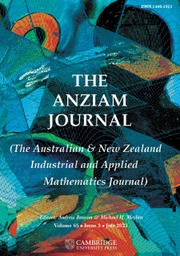Article contents
A spot welding reliability problem
Published online by Cambridge University Press: 17 February 2009
Abstract
When multiple operators are connected to a single power source which is not large enough to simultaneously supply all users, interference can take place. This paper considers two models of a spot welding station which differ in the method of resolving interference between users. In the first model the system is allowed to become overloaded and the consequent deterioration in weld quality is accepted. In the second model any request which will overload the system is rejected. Expressions are found for (a) the proportion of poor quality welds in the first model and (b) the probability of operators being rejected in the second model. Numerical results are given which indicate how small the power supply can be made for a typical welding shop while keeping interference at a minimal level.
Information
- Type
- Research Article
- Information
- Copyright
- Copyright © Australian Mathematical Society 1988
References
- 1
- Cited by

